Parade (2009)
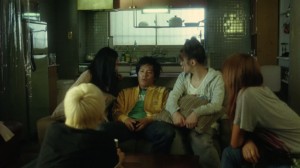 On an October 2011 episode of WTF, Marc Maron’s podcast where he interviews other comics, comedian Hannibal Buress talked about his first venture in NY when he was a struggling comic. Buress says then, he was going to as many open mics as he could. But moving from Chicago to follow his dream, he was in NY for only four months before he came back to his parents’ home, tail between his legs. Detailing what he went through, Buress skimmed over what was seemingly the most interesting part about his journey from couch to couch, stopping at hostels when he could afford them. It was that he had resorted to sleeping on NYC trains when he had nowhere else to go. It wasn’t so much the desperation that was worth digging into, though; it was how he got there that interested Maron — and the audience, too; or at least me — but Buress never thought much about it and wasn’t sure how he’d gotten to that point.
On an October 2011 episode of WTF, Marc Maron’s podcast where he interviews other comics, comedian Hannibal Buress talked about his first venture in NY when he was a struggling comic. Buress says then, he was going to as many open mics as he could. But moving from Chicago to follow his dream, he was in NY for only four months before he came back to his parents’ home, tail between his legs. Detailing what he went through, Buress skimmed over what was seemingly the most interesting part about his journey from couch to couch, stopping at hostels when he could afford them. It was that he had resorted to sleeping on NYC trains when he had nowhere else to go. It wasn’t so much the desperation that was worth digging into, though; it was how he got there that interested Maron — and the audience, too; or at least me — but Buress never thought much about it and wasn’t sure how he’d gotten to that point.
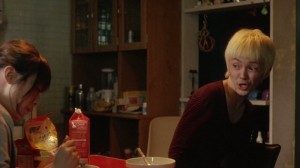 If a movie had been about Buress, but had taken place in Japan among other fledgling 20-somethings, it would probably resemble Isao Yukisada’s Parade. In Parade, character Satoru — a waif thin hustler with bleach-blond hair and a face like Ashton Kutcher’s — is the mysterious figure who enters the lives of four roommates. They’re all living illegally in a 2LDK (2 living spaces/bedrooms, one dining room, one kitchen). And, like Buress, Satoru never wants to talk and certainly never wants to think about how he got where he ended up. Did he have a bad family life? He won’t say. Why does he seem content about being picked up by strange men who literally size him up, in a less than savory area (prone to muggings and beatings), just to earn a few hundred dollars a night? Where does this money go? We never really find out, and neither do the roommates, Ryosuke, Mirai, Kotomi, and Naoki.
If a movie had been about Buress, but had taken place in Japan among other fledgling 20-somethings, it would probably resemble Isao Yukisada’s Parade. In Parade, character Satoru — a waif thin hustler with bleach-blond hair and a face like Ashton Kutcher’s — is the mysterious figure who enters the lives of four roommates. They’re all living illegally in a 2LDK (2 living spaces/bedrooms, one dining room, one kitchen). And, like Buress, Satoru never wants to talk and certainly never wants to think about how he got where he ended up. Did he have a bad family life? He won’t say. Why does he seem content about being picked up by strange men who literally size him up, in a less than savory area (prone to muggings and beatings), just to earn a few hundred dollars a night? Where does this money go? We never really find out, and neither do the roommates, Ryosuke, Mirai, Kotomi, and Naoki.
 If anything, Satoru is a blank slate for the four of them to project their fears onto, and Parade is very much about how these five people find outlets for their anger. Sometimes they want to be caught, sometimes they’re too causal to care. Satoru, like the main character in Kim ki-Duk’s 3-Iron, likes to break into people’s houses after they’ve left for work and act like he lives there. He’s not trying to steal anything; he simply wants a nap and cup of coffee. This is hardly the dirtiest secret among the group, who are introduced in four sections as if we’re being told the same story four times. Yukisada’s strategy is to explore the repetition and boredom the roommates go through, that any old thing will add interest. Kotomi thinks they live next door to a whorehouse and wants to pay Ryosuke to find out. Ryosuke is having an affair with one of his friend’s girlfriends, but mostly beats himself up for being so timid. Mirai, a mediocre sketch artist, has a secret way she manages to calm down and not take herself so seriously. Naoki, who works for a film distributor, uses late night jogging as his outlet, but can’t help but follow people around out of curiosity. (It’s no coincidence he has a poster for Christopher Nolan’s debut film Following in his office.)
If anything, Satoru is a blank slate for the four of them to project their fears onto, and Parade is very much about how these five people find outlets for their anger. Sometimes they want to be caught, sometimes they’re too causal to care. Satoru, like the main character in Kim ki-Duk’s 3-Iron, likes to break into people’s houses after they’ve left for work and act like he lives there. He’s not trying to steal anything; he simply wants a nap and cup of coffee. This is hardly the dirtiest secret among the group, who are introduced in four sections as if we’re being told the same story four times. Yukisada’s strategy is to explore the repetition and boredom the roommates go through, that any old thing will add interest. Kotomi thinks they live next door to a whorehouse and wants to pay Ryosuke to find out. Ryosuke is having an affair with one of his friend’s girlfriends, but mostly beats himself up for being so timid. Mirai, a mediocre sketch artist, has a secret way she manages to calm down and not take herself so seriously. Naoki, who works for a film distributor, uses late night jogging as his outlet, but can’t help but follow people around out of curiosity. (It’s no coincidence he has a poster for Christopher Nolan’s debut film Following in his office.)
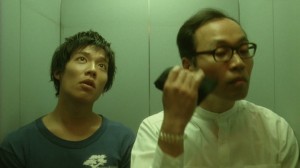 With all of these character introductions, Parade threatens to get too broad. It’s only a 2-hour film, not a mini-series. And Yukisada does struggle at times to avoid heavy-handed dialogue (“That merry-go-round is freezing at night.”) which doubles as commentary about the meaninglessness of life. But he does avoid clichés as best as he can, including a fascinating bit where it appears that the roommates are happier to accept Satoru if he’s gay, and that being straight would threaten his image.
With all of these character introductions, Parade threatens to get too broad. It’s only a 2-hour film, not a mini-series. And Yukisada does struggle at times to avoid heavy-handed dialogue (“That merry-go-round is freezing at night.”) which doubles as commentary about the meaninglessness of life. But he does avoid clichés as best as he can, including a fascinating bit where it appears that the roommates are happier to accept Satoru if he’s gay, and that being straight would threaten his image.
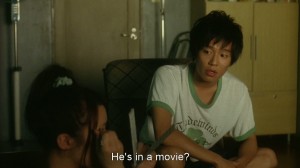 Parade rarely goes conventional, and so it’s odd that the initial set-up plays like a moldy sitcom. During that introduction, it’s as if we’re watching a slightly creepy episode of Three’s Company, especially with the wacky hi-jinx of fearing living next door to a whorehouse, and the illegal living situation. But that’s just Yukisada’s way of lulling us to sleep, which certainly explains the repetitive score which sounds like it was deleted from a ’70s Blaxploitation film. Sitcoms are inherently inconsequential, which plays into Yukisada’s exploration of how the characters slowly realize how little of an impact they make in society. The worst thing they can think of to do to Satoru is kick him out of the house, which would mean a hell of a lot more if he were paying rent, or even knew anyone before deciding to sleep on their couch. And then there are all the subplots about how these roommates rely on each other. But they have no real intimate knowledge other than the most basic bits of information that they could have gleaned in 30 seconds, not years of living with each other. That’s what makes their mutual general passivity so interesting; especially compared to the film 2LDK, where it takes very little for two female roommates to be at each other’s throats. You’d think adding roommates would escalate the tension, but it has the opposite effect in the case of Parade. [Inside the apartment, the camera often moves like a 7-11 security camera.] They’re all so deadened in their lives that all it takes is the appearance of someone like Satoru to shake up their day. They don’t know how they got there, the equivalent of finding yourself sleeping on the train, and wherever you wake up is where you must live.
Parade rarely goes conventional, and so it’s odd that the initial set-up plays like a moldy sitcom. During that introduction, it’s as if we’re watching a slightly creepy episode of Three’s Company, especially with the wacky hi-jinx of fearing living next door to a whorehouse, and the illegal living situation. But that’s just Yukisada’s way of lulling us to sleep, which certainly explains the repetitive score which sounds like it was deleted from a ’70s Blaxploitation film. Sitcoms are inherently inconsequential, which plays into Yukisada’s exploration of how the characters slowly realize how little of an impact they make in society. The worst thing they can think of to do to Satoru is kick him out of the house, which would mean a hell of a lot more if he were paying rent, or even knew anyone before deciding to sleep on their couch. And then there are all the subplots about how these roommates rely on each other. But they have no real intimate knowledge other than the most basic bits of information that they could have gleaned in 30 seconds, not years of living with each other. That’s what makes their mutual general passivity so interesting; especially compared to the film 2LDK, where it takes very little for two female roommates to be at each other’s throats. You’d think adding roommates would escalate the tension, but it has the opposite effect in the case of Parade. [Inside the apartment, the camera often moves like a 7-11 security camera.] They’re all so deadened in their lives that all it takes is the appearance of someone like Satoru to shake up their day. They don’t know how they got there, the equivalent of finding yourself sleeping on the train, and wherever you wake up is where you must live.
 Maybe Hannibal Buress would understand?
Maybe Hannibal Buress would understand?
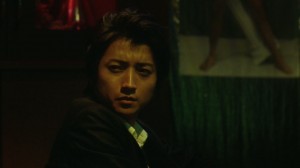 P.S. There’s a brief mention of Soba, which is like the Fanta of sodas in terms of the various flavors. The way Kotomi describes it; it sounds the way that Juggalos describe Faygo, which is another cheaply produced beverage with a multitude of color options. God forbid Kotomi, who is already in love with a soap opera actor, is also a fan of the Insane Clown Posse.
P.S. There’s a brief mention of Soba, which is like the Fanta of sodas in terms of the various flavors. The way Kotomi describes it; it sounds the way that Juggalos describe Faygo, which is another cheaply produced beverage with a multitude of color options. God forbid Kotomi, who is already in love with a soap opera actor, is also a fan of the Insane Clown Posse.



